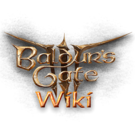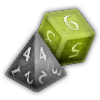More actions
Damage Sources (DS) vs. Damage Riders (DR)
A damage source could be described as what initializes the damage. Examples include striking a target with your weapon, a spell, or thrown items such as an ![]() Alchemist's Fire. Damage sources often require the use of an action (e.g. throwing an object such as a grenade), bonus action (e.g. making an attack with your offhand weapon while dual wielding), or reaction (e.g. the spell).
Alchemist's Fire. Damage sources often require the use of an action (e.g. throwing an object such as a grenade), bonus action (e.g. making an attack with your offhand weapon while dual wielding), or reaction (e.g. the spell).
A damage rider is something which adds additional damage onto the damage source. It can only be present in the event there is an applicable damage source for it to "ride along" with, hence the name of a damage rider. Examples of damage riders include the spell adding damage to the damage from a Warlock's or weapon attacks, coatings applied to weapons providing additional damage to a weapon attack, a 6th level applying their elemental affinity to a spell of the appropriate damage type, or a raging adding rage damage to their weapon attacks. Many damage riders are gained from passives or other forms of buffs. Any eligible damage riders from a damaging effect will be applied to a damage source which is a part of that damaging effect.
Damage Riders treated as Damage Sources (DRS)
There are some damage riders which defy the typical trends described above. They still must "ride along" with a damage source in order to be applied, but when the damage is calculated they are treated as damage sources instead of damage riders. This means that these "damage riders which are treated as damage sources" can then cause normal damage riders to be applied once again as part of the same ability (e.g. attack or spell) which caused the damage.
Example Calculation
A character with 18 Strength, the Tavern Brawler Feat, , and the ![]() Ring of Flinging uses the
Ring of Flinging uses the ![]() Returning Pike to make a thrown weapon attack against a target which is affected by .
Returning Pike to make a thrown weapon attack against a target which is affected by .
Damage Sources (DS):
- Thrown weapon attack using the
 Returning Pike applies 1d10 (damage die) + 1 (weapon enchantment) + 4 (Strength modifier) piercing damage
Returning Pike applies 1d10 (damage die) + 1 (weapon enchantment) + 4 (Strength modifier) piercing damage
Damage Riders (DR):
- add +1 Lightning Damage to each damage source
- The
 Ring of Flinging adds 1d4 damage which is of the same type as the weapon used (piercing in this example) to each damage source.
Ring of Flinging adds 1d4 damage which is of the same type as the weapon used (piercing in this example) to each damage source. - adds 1d6 necrotic damage to each damage source.
Damage Riders treated as Damage Sources (DRS):
- The Tavern Brawler feat allows characters to add their Strength modifier an additional time to damage rolls when using unarmed strikes, improvised weapons, or thrown weapons. When applied to melee attacks this damage bonus is treated as a damage rider. But as of Patch 3 with thrown weapons, this +4 piercing damage from the character's strength score being applied a second time due to the tavern brawler feat being treated as a damage source.
Calculating total damage:
To determine the total damage applied take each DS and DRS. Then apply the damage riders onto each of these. In this example that means one should evaluate the pike damage source plus all damage riders, followed by the Tavern Brawler damage source and all damage riders applied again.
Tavern Brawler on thrown weapon attacks is a DRS, meaning the damage roll in the above scenario would on average yield 28.5 total damage (ignoring resistances) calculated as follows:
 1d10 (5.5 avg) (weapon damage die) + 1 (weapon enchantment) + 4 (Strength modifier)
1d10 (5.5 avg) (weapon damage die) + 1 (weapon enchantment) + 4 (Strength modifier)  Piercing from the
Piercing from the  Returning Pike thrown weapon attack, [DS]
Returning Pike thrown weapon attack, [DS]
 +1d4 (2.5 avg)
+1d4 (2.5 avg)  Piercing damage from the
Piercing damage from the  Ring of Flinging, [DR]
Ring of Flinging, [DR]- +1
 Lightning damage from , [DR]
Lightning damage from , [DR]  +1d6 (3.5 avg)
+1d6 (3.5 avg)  Necrotic damage from , [DR]
Necrotic damage from , [DR]
- +4
 Piercing damage from Tavern Brawler, [DRS]
Piercing damage from Tavern Brawler, [DRS]
- +1d4 (2.5 avg)
 Piercing damage from the
Piercing damage from the  Ring of Flinging being applied to Tavern Brawler damage source, [DR]
Ring of Flinging being applied to Tavern Brawler damage source, [DR] - +1
 Lightning damage from being applied to Tavern Brawler damage source, [DR]
Lightning damage from being applied to Tavern Brawler damage source, [DR]  +1d6 (3.5 avg)
+1d6 (3.5 avg)  Necrotic damage from being applied to Tavern Brawler damage source [DR]
Necrotic damage from being applied to Tavern Brawler damage source [DR]
- +1d4 (2.5 avg)
As a hypothetical scenario to show the impact that this minor detail can have, instead imagine Tavern Brawler were to be treated as a DR in the above scenairo. In this hypothetical scenario the above damage roll would yield 21.5 total damage on average (ignoring resistances) calculated as follows:
 1d10 (5.5 avg) (weapon damage die) + 1 (weapon enchantment) + 4 (Strength modifier)
1d10 (5.5 avg) (weapon damage die) + 1 (weapon enchantment) + 4 (Strength modifier)  Piercing from the
Piercing from the  Returning Pike thrown weapon attack, [DS]
Returning Pike thrown weapon attack, [DS]
 +1d4 (2.5 avg)
+1d4 (2.5 avg)  Piercing damage from the
Piercing damage from the  Ring of Flinging, [DR]
Ring of Flinging, [DR]- +1
 Lightning damage from , [DR]
Lightning damage from , [DR]  +1d6 (3.5 avg)
+1d6 (3.5 avg)  Necrotic damage from , [DR]
Necrotic damage from , [DR]- +4
 Piercing damage from Tavern Brawler, [If Tavern Brawler were to hypothetically be treated as a DR with thrown weapon attacks]
Piercing damage from Tavern Brawler, [If Tavern Brawler were to hypothetically be treated as a DR with thrown weapon attacks]
DRS Effects
The following are a list of items and abilities which have DRS effects, and what the relevant DRS effect is.
| Item | Act Found | Relevant Effect | Notes |
|---|---|---|---|
| All | Deals Weapon Damage + 2d4 |
N/a | |
| All | Deals weapon damage + 2d4 |
N/a | |
| All | Deals weapon damage + 2d4 |
N/a | |
| All | Deals weapon damage + 2d4 |
N/a | |
| All | Spend 6 m / 20 ft of your movement to deal additional physical damage (minimum 1) on each successful weapon attack for the rest of the turn. | Weapon Action available to all Greataxes. Recharges on Short Rest | |
| One | All enemies within 6m of range have a 1d4 penalty to Charisma, Wisdom and Intelligence Saving Throws. Affected creatures receive an extra 1d4 |
N/a | |
| One | Deals an additional 1d4 |
N/a | |
| One | Deals an additional 1d4 |
N/a | |
| One | Deals an additional 1d6 |
N/a | |
| One | Inflicts Shattered on hit. When attacking a Shattered target, deal an additional 1d4 |
N/a | |
| One | When the wielder has 50% |
N/a | |
| Two | On a Critical Hit, the target takes an extra 10 |
N/a | |
| Two | When the wielder attacks with |
N/a | |
| Three | Your deals an additional 1d4 |
N/a | |
| Three | Whenever you score a Critical Hit, deal an additional 1d6 |
N/a | |
| Three | Gain a +1 bonus to Attack Rolls, damage, and Spell Save DC for every foe you slay, up to a maximum of +3. | N/a | |
| Three | Deal additional damage equal to your Proficiency Bonus. On a hit, Large, Huge, or Gargantuan creatures take an additional 2d6 |
This is a weapon action specific to this weapon. As with all weapon actions, it recharges on a short rest. | |
| Three | (Only when wielded in main hand) When you make an attack with |
N/a | |
| Three | On a hit with a melee weapon, use a reaction to deal additional |
N/a |
| Class | Level
Obtained |
Relevant Effect | Notes |
|---|---|---|---|
| 1 | : Deal an extra 1d6 damage to a foe you have Advantage against. You can also use Sneak Attack if you have an ally within 1.5m / 5ft of the target and you don't have Disadvantage.
|
Sneak Attack is only treated as a damage source if you use the automatic reaction. Using the Sneak Attack action is instead treated as a damage rider. | |
| 2 | : Your weapon emanates divine might as you strike, dealing an additional 2d8 |
N/a | |
| 3 | : Once per turn, your weapon attack deals an extra 1d8 |
N/a | |
| 8 | : Once per turn, deal 1d8 damage (damage type depends on Cleric Domain) in addition to your weapon's damage. | The 1d8 | |
| 11 | : Teleport to a foe from a hidden position, striking them with the creeping, psychic ferocity of the shadows themselves, dealing an additional 3d8 |
N/a | |
| 12 | : Your melee attacks deal additional Necrotic equal to your Charisma modifier. | N/a |
| Ability | Ability Type | Relevant Effect | Notes |
|---|---|---|---|
| 1st Level Spell | Mark a creature as your quarry to deal an additional 1d6 |
Only when used with thrown weapon attacks. | |
| Feat | When you make an unarmed attack, use an improvised weapon, or throw something, your strength modifier is added twice to the damage and Attack Roll | Only when used with thrown weapon attacks. |
Potential Bugs
The following items compose a non-exhaustive list which indicates that the "Damage Riders" as compared to "Damage Riders treated as Damage Sources" may include several bugs and therefore many of these abilities may change in future patches:
- Patch 3 changed Lightning Charges from a "Damage Rider treated as a Damage Source" to a "Damage Rider."
- Tavern Brawler is treated as a Damage Rider with unarmed attacks and improvised weapon attacks, but as a "Damage Rider treated as a Damage Source" when it comes to thrown weapon attacks.
- Sneak Attack is treated as a Damage Rider when a character uses the Sneak Attack action, but as a "Damage Rider treated as a Damage Source" when Sneak Attack is applied by the automatic reaction system.

